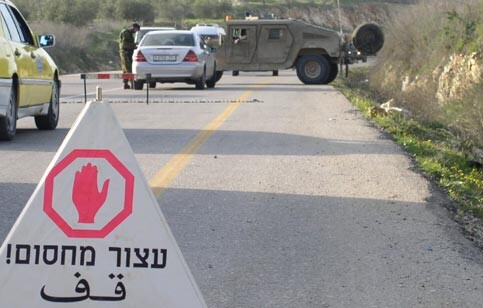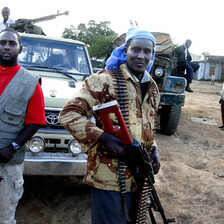3 July 2005

A flying checkpoint. “Suddenly it bottlenecks, then halts. Hajiz, shouts a taxi driver coming from the opposite direction. Checkpoint. (CMAQ)
There’s a checkpoint between Birzeit and Ramallah. Out of the blue. Up until this moment, everything seemed normal: the honking of taxis, the flow of traffic over snakelike mountain roads, the odd calm of drivers as they vie for imagined lanes on hairpin curves. Suddenly it bottlenecks, then halts. “Hajiz,” shouts a taxi driver coming from the opposite direction. Checkpoint.
There are approximately 400 Israeli checkpoints throughout the West Bank, and over 20 in the Gaza Strip, many of which will remain even after the planned settler disengagement in August. The rationale behind checkpoints, as Israeli colonists will argue, is security. In a sense, their claim is valid. Whether in the U.S., Central Asia, Argentina or Israel, forceful colonization has been met consistently throughout history with popular opposition – hence the international law that allows people to resist colonization by any means necessary. The Israeli checkpoints are themselves illegal.
But a certain degree of moral blindness accompanies aggressive colonial nationalisms, such as Zionism, which is why it is hard to explain to Americans or Israelis (who are often one in the same) that many hajiz have absolutely nothing to do with security. In fact, one doesn’t have to go far to find an off duty – or on duty – Israeli soldier who will boast that many checkpoints are designed to frustrate the psychological and economic integrity of Palestinian society.
It’s happening already before my eyes. The calm is replaced with frustration, both audible and visible. Arms flail out of car windows. Honking becomes more frequent. A baby, which until now I hadn’t noticed, cries in the back of my taxi. A gust of bluish bus exhaust empties into my open window. Nausea takes hold.
It’s at times like these that, as a newcomer to the West Bank, a thousand images spring to mind. How many soldiers will there be? Will they be harassing old women again? Perhaps we will find a group of boys handcuffed on the side of the road. Does everyone feel this, or are they used to it by now? We round another bend, and as I dial a friend in Ramallah to tell her I’m running late, my stomach tightens as if bracing for a punch.
But there’s nothing. Traffic picks up, the bottleneck clears. Nothing.
I meet Lina Salameh at Minara Circle in downtown Ramallah. Lina is a sharp, vibrant woman in her mid-twenties who administers gender programs for the Palestinian Authority. I know her through a common friend in Boston, who is Jewish but not Zionist. Lina has been a marvelous help in my orientation of Ramallah as well as my Arabic proficiency, which recently graduated from born-without-tongue to brain-damaged status – progress is progress. Today we’re going to the Ramallah office of the Palestinian General Federation of Trade Unions (PGFTU), but first I ask Lina about the invisible hajiz on the Bizeit road.
She explains that what I experienced was a “flying checkpoint”: For no apparent reason, an Israeli jeep will sometimes appear on the road to Birzeit and establish a checkpoint. They stop cars to inspect identification papers or to interrogate university students. Their jurisdiction is “validated” by their guns. Otherwise, their presence is criminal.
The duration of flying checkpoints is based on the patience of the soldiers who operate them, that is, there’s only so long a 22-year-old conscriptee in body armor can bear the July sun and taxi exhaust. If the checkpoint provokes stone throwing, then the soldiers have something to do: I would later find out that a twelve-year-old boy was arrested that day. I would also hear that the checkpoint team moved its operations into Birzeit, where university graduation festivities were taking place.
But all I know now is what Lina tells me, as we pass the Al-Kabana Theatre and hang a left down a narrow street. She smiles, shaking her head, “You know, it’s ironic that we’re having this discussion on our way to the PGFTU. Ask them about checkpoints.”
I don’t have to. It happens to be the first subject brought up by the head of the PGFTU’s Ramallah office, Abed Aruri, who I came to meet. Abed is a brawny, gentle-natured man in his fifties, with short-cropped grey hair and mustache. He greets me warmly using a limited collection of English phrases. I respond with a more limited lexicon of Arabic. He shuts the door to a balcony and someone brings us coffee. The PGFTU office is drafty, and from the street, inconspicuous. When Lina and I arrived, we navigated through a cue of some twenty workers, who crowded the hallway waiting to renew their health insurance.
I ask Abed (through Lina) why he was so intent on discussing the topic of checkpoints. Because I’m a foreigner, he explains, it’s essential that I understand what separates Palestinian workers from those in other countries. Checkpoints are perhaps the most salient difference, as they fortify Israel’s control over Palestinians’ livelihood. Since South African Apartheid, no ethnic-based public policy has been so sophisticated. This is where workers are arbitrarily and deliberately denied entry, or where perishable goods, produced by Palestinian industry, are delayed passage until they rot. In some cases, Abed says, bribery becomes the norm for those who can afford it.
As Abed continues explaining the dampening effects that checkpoints have on Palestine’s economy, I privately think about Western misperceptions on agreements like Oslo, the Camp David talks of 2000 or the Road Map. Why, I’ve often wondered, did Westerners not grasp the fraudulence that went into these? The answers become clearer as I listen to Abed. Had Israel genuinely wanted the existence of a viable Palestinian state, checkpoints would not be a continuing reality. Until something changes, checkpoints are a constant reminder of what Israel really wants.
The concept of organized Palestinian labor itself has never been uncomplicated. It emerged in the 1920s only to be fragmented and suppressed by the ruling British mandate. Although Palestinian unions regained momentum throughout the 1960s, they were forced underground following the 1967 war, when Israel illegally annexed the West Bank and Gaza. It wasn’t until the early 1990s that the PFTU severed its direct political affiliation with the Palestinian Liberation Organization and became the PGFTU.
Although today the PGFTU is recognized internationally, and its secretary general, Shaher Sa’ed, sits on the board of the International Congress of Federated Trade Unions, its problems are unique. Shaher, for instance, faces the checkpoint phenomenon even when he leaves Palestine.
He explains this to me on the following day when we meet for coffee in Ramallah. (Concurrent to our meeting, and unbeknownst to us, Shaher’s hometown of Nablus was weathering an Israeli air strike and severe checkpoint closures.) As we speak, Shaher is attentive, yet visibly travel weary. He tells me that he was recently invited to attend the AFL-CIO’s quadrennial convention in Chicago, however, a spurious visa controversy stands in his way.
“The Israelis tell me they have ‘good news and bad news,’” he says. “The good news is I get the visa. The bad news, they say, is that the FBI will be waiting for me. And for what? What business do I have with America? I’ve never been there.” I would later be told that one of Shaher’s middle names, which happens to be Hussein, may have set off alarms at the FBI.
That would make sense. There can’t be that many Hussein’s in the Middle East.
Zachary Wales is a journalist and masters student at Columbia University’s School of International and Public Affairs. He is also a co-founder of Labor for Palestine, and he currently takes summer courses at Birzeit University.
Related Links





